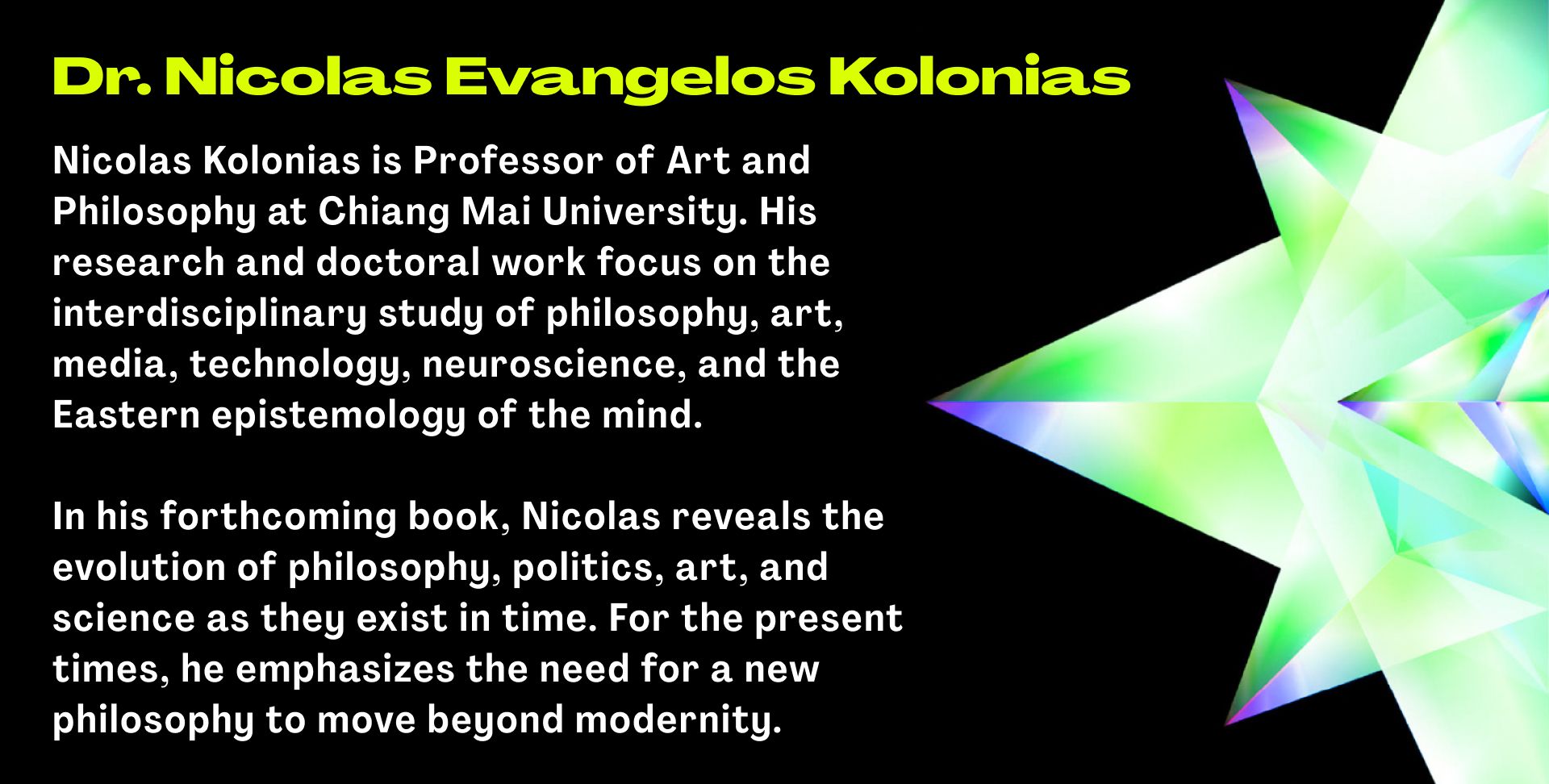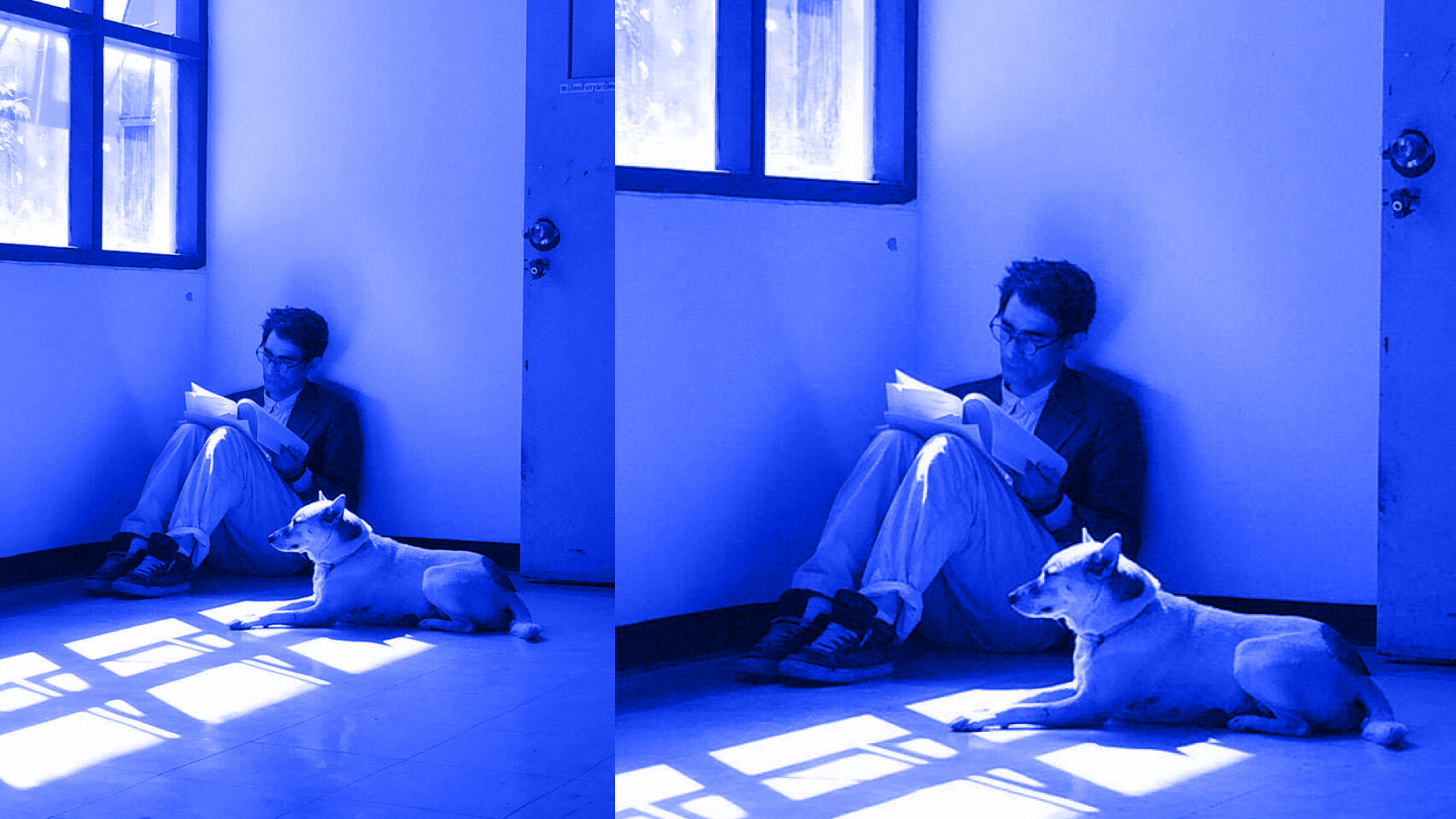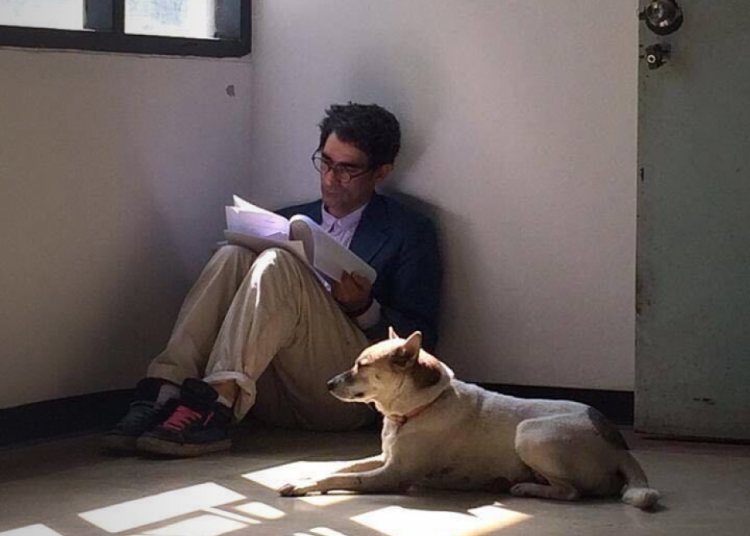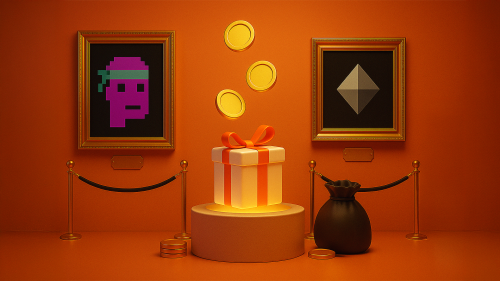Nicolas, your work explores the interconnections between philosophy, technology, politics, art, and the mind. Part of your work helps us understand the evolution of our identity in the context of technology. We want to understand what the digital age means for our identity. Can you give us an introduction?

Our identity is fluid. It comes in many forms. And it changes as we become our professional, social, or sexual selves.
What is digital identity? First, we need to understand how we approach the digital. As natural, as real, as fake, as representation, or as technology?
Plato presents us with an ontology of images. Objects in the physical and digital world appear as images in consciousness. Okay? Physical or digital, it does not matter. But we have to fully understand the system of images.
Everything is an image in your consciousness. Think of your brain as an image. Your touch is an image of touching. Images of matter, images of light, and images of your identity.
Your brain captures images, synthesizes them, creates a consciousness and then leaves the images. That’s why identity is fluid. It’s not something you lose or win.
Bruce Lee says, “Be like water.” Can we be water? Yes, we can. If you pour water into a network, it will expand through it and become something new. Becoming and growing our consciousness is our evolution.
That’s why Plato says, “Stop defining as a being.” You are not a being – you are a becoming. The identity belongs in time, it does not belong to you. You belong in time to make it more simple.
Is that the role of technology? It gives us the chance to expand our consciousness?
Exactly. Technology is giving us a completely new image of how we perceive the world.
It all starts with the expanded use of glass during the Renaissance. That process is still going on. The screen you are looking at right now is glass, too.
The Renaissance saw a revival of mathematics, inspired by rediscovered Asian and Greek texts. This revival led to significant advances in optics. Galileo Galilei and René Descartes followed, innovating the telescope. Then, Newton’s color theories shaped our understanding of light. And all of this was reflected in the art of their time.
With art, photography, cinema and computer programs, we manipulate light and information.
In photography, the capture of past light brings it into the present and into the future. The cinema creates an image of movement.
We have been stumbling upon a different dimensional perception of glass systems for hundreds of years. Our technology is not new. This is super important to understand. Because people act as if digital technology came out of nowhere.
With digital technology, I can program the image within the image. I don’t need someone to capture an image of the past. I can create through my coding. I can create a whole new image from scratch. I don’t need to have nature and create a copy of it.
As technology evolves, consciousness has to interact with a larger system of images. So we’re tripping – upon a dimensional perception of glass systems.
And within that growing system, we create our identity images. The video game identity, the Facebook identity, the Instagram identity, your loving identity, your business identity, whatever identity you want. All these new types of images.
That’s the challenge.
And how do we meet this challenge?
It’s a matter of the mind. It always has been. It’s not a matter of the outside. That’s what Plato tells you. That’s what Buddha tells you. It’s what Spinoza and Nietzsche and Deleuze tell you. In the end, it’s about how to know the self.
Now humanity has reached the point of having a wider system of images further than God – further than the notion of God. It has created airplanes, the cinema, and the internet.
Your consciousness has to grow. You cannot stay with your hippie ideas or 90s imitations forever.
With the advent of biometrics, surveillance, and AI, some see a dystopian scenario coming.
Dystopian or not – it’s up to you. If you take a leftist example, a post-Marxist example, if you criticize rather than create, you are doomed.
The Marxist dystopian image is a capitalist system that takes you away from your nature. It says you will lose your mind, become depressed and brainwashed. Information becomes fake. There is more propaganda, a kind of 1984 fiction.
But even if I try to control your perspective, in the end it’s just an image. You are a participant with your own image. And you have to be selective. You have to develop your image, your consciousness, to walk in it.

We are clinging to the past, rather than creating something new. In a previous conversation you and I had, you said this could be the time to connect and stop dividing.
Yes, that’s the important thing. It’s the same in politics, art, and philosophy. If you just copy the old, you will never win. It’s about the creative aspect within. Always. You have to be creative to synthesize nicely, to go to your beauties, to go further and further and further.
We cannot fix capitalism with Marx. Marx wrote at a time when technology was completely different. He was confronted with completely different questions. Good, Marx is beautiful. Good. End of story. We have to go further than Marx, we have to go further than imagining leaders.
We don’t live in the ’40s. In the 40s, everybody wanted the leader. We don’t live in the times of Hitler and empires anymore. It was the empires that did terrible things. Everybody was responsible. Let’s move on.
We don’t need leaders anymore. We can’t say, “Oh, we didn’t have the information.” We have a new technology now. We have a network. We all have the information now.
Who cares about left and right today? Young people want their lives. Everyone has their own interests. They want to move on.
So let’s be present and take responsibility. We have to see the evolution of humanity and move forward. That’s it. We’re copying the past ideas of modernity. It becomes historical. Let’s finish it and go beyond it. Why do we have to be modern forever? It was not so beautiful in the end.
We have developed our minds. We live in a network society. We want new systems of governance.
How do you live your life? What kind of mind do you have? How do you behave towards a poor person? How do you treat a rich person? That’s important to me.
Don’t tell me about your identity. Don’t hide behind the left or right.
And this is how we stop dividing?
That’s what I believe. But in order for that to happen, we have to develop a new kind of philosophy. We already have a new science, but we don’t have the right philosophy of metaphysics.
For that to happen, we have to understand ourselves in completely new terms. In this system of philosophy, the practice is to understand that you don’t exist. You have to deeply understand and believe that.
As a human, you cannot understand time. What you see is always an image of the past, an image of your memory created by your consciousness. And that takes time to process and manifest. Kant will call this the synthesis of time. You have to understand that you do not live in the present.
Nothing exists as such. It exists in time. It exists in relation to your memory and in relation to yourself, your psychology, your perspective and in relation to the whole system of images that you live.
And what you have to do is to go to put yourself into a new becoming, into a new system of images, become happy and move on.
We have to understand this reality and our evolution.
In that context, what is the significance of our network and technology?
Everything is interconnected. It always has been. You see deeper networks, you see more beauty, you see more connections.
We create networks, we stop creating centers. It’s better, it’s more advanced than before with our leaders. That’s an evolution, that’s a better mind, that’s a better imagination to begin to understand that we are interconnected. That’s ecological thinking, a more ecological design.
We need the network to move forward in our evolution and in our new understanding.

In this system, you can take the best and you can take the worst. It’s not the image that’s good or bad, it’s how you approach the image. If you live in a system of images, your dreams, your failures, your psychology, your whole method of seeing yourself and perceiving your psychology will change. To me, that’s the future.
For me, this is art. To create, to elevate beauty itself. Yes, beauty. To feel it, to live in that image, is so beautiful. I mean, you live in a world of images, don’t forget that.
That’s what our conversation proves, Sven. We are images talking to each other. And we affect each other through these images, and they’re real. So why don’t we create our own realities, our own beauties, our own world of images, our own cinema.
That’s what the digital is pushing us to do. If you don’t do that, you’re just going to have garbage in your database.
Nicolas, thank you for this conversation. I’m looking forward to creating more beauty.
Yeah, that’s the concept, right? Too much negativity. Too much criticism. We don’t need this anymore. We need answers and beauty.



